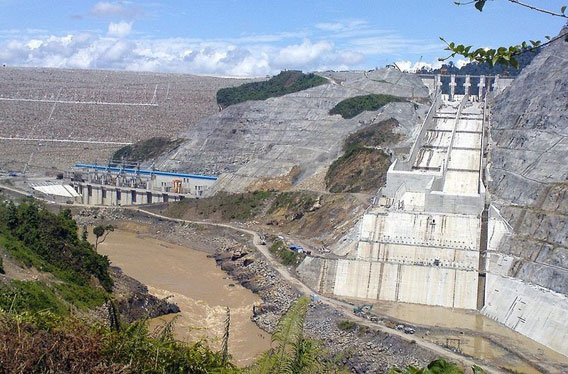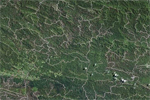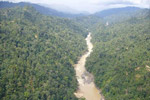
Bakun dam during construction. Photo by: Mohamad Shoox.
A top minister in the Malaysian state of Sarawak has told activists campaigning for cleaner energy to ‘stop breathing’, reports The Borneo Post.
“I would like to throw a challenge at them (critics) on two fronts,” Land Development Minister Tan Sri Dr James Jemut Masing told the newspaper. “Firstly, please provide us with the best source of alternative power besides fossil fuel, and secondly, they have to stop breathing if they criticize just for the sake of criticizing.”
Masing was responding to the South-East Asia Renewable Energy People’s Assembly (Searepa), a five-day conference that took place in neighboring Sabah. The conference concluded with a set of proposals to shift toward less damaging sources of energy. One of the recommendations was a halt to a series of large dams planned in Sarawak. Critics say the dams will displace thousands of people, flood vast areas of rainforest, and serve primarily as a vehicle for state corruption. The dams, which will cost tens of billions of dollars, will produce substantially more energy than Sarawak consumes.
“We understand that the 12 dams if developed fully will generate 20,000 megawatts in Sarawak. Based on media reports quoting leaders, Sarawak will have a surplus of electricity for many years now that there is power generated from the Bakun dam,” said SEAREPA Programme Coordinator Gabriel S. Wynn in a statement. “We also urge Tan Sri Masing to address the key concerns of the group as communicated through two declarations that had raised the impact of development projects on the people and ecosystems of Sarawak.”
Masing told The Borneo Post the dams would be built as needed to “produce electricity on a commercial scale”. He added that “Hydro-electricity is renewable and clean”.
However research in the Amazon indicates that tropical dams in forest areas can be a signifiant source of methane, a potent greenhouse gas.
“The myth can no longer be sustained that tropical dams produce clean energy,” said Philip Fearnside, a researcher at Instituto Nacional de Pesquisas da Amazônia in Manaus.
“Dams release methane, a gas with a much higher impact on global warming per ton than carbon dioxide, especially during the first decades after construction. These emissions are often even higher than those of generating electricity from fossil fuels for decades, thus corresponding to the narrow time interval when global warming must be brought under control to avoid massive impacts.”
Searepa involved some 120 participants from 11 nations. The meeting was called after local activists effectively blocked a controversial coal plant in Sabah last year. That plant would have jeopardized local forests and a portion of the Coral Triangle, an area renowned for its marine biodiversity. Opposition to the plant was grew after a team led by Dan Kammen, a renewable energy expert from UC Berkeley, produced a comprehensive assessment showing clean energy options that could replace the coal plant.
Related articles
Indigenous blockade expands against massive dam in Sarawak
.150.jpg)
(10/08/2012) Indigenous people have expanded their blockade against the Murum dam in the Malaysian state of Sarawak, taking over an additional road to prevent construction materials from reaching the dam site. Beginning on September 26th with 200 Penan people, the blockade has boomed to well over 300. Groups now occupy not just the main route to the dam site, but an alternative route that the dam’s contractor, the China-located Three Gorges Project Corporation, had begun to use.
Sarawak tribe calls on German company to walk away from controversial dam
(06/19/2012) Indigenous people from the Malaysian state of Sarawak have sent a letter to the German company, Fichtner GmbH & Co. KG, demanding that the consulting group halt all activities related to the hugely-controversial Baram dam, reports the NGO Bruno Manser Fund. Critics of the dam and it parent project known as the Sarawak Corridor of Renewable Energy (SCORE) initiative, say the hydroelectric dam will displace 20,000 people and flood 40,000 hectares of primary rainforest.
Mining cancellation throws wrench into Sarawak dam-building spree

(03/27/2012) The world’s third largest mining company, Rio Tinto, and a local financial and construction firm, Cahya Mata Sarawak (CMS), have cancelled plans for a $2 billion aluminum smelter to be constructed in the Malaysian state of Sarawak. The cancellation calls into question Sarawak’s plan to build a dozen massive dams—known as the Sarawak Corridor of Renewable Energy (SCORE) initiative—that were proposed, in part, to provide power to the massive aluminum smelter. However, the mega-dam proposal has been heavily criticized for its impact on Sarawak’s rivers, rainforest and indigenous people.
Activists form network to fight Sarawak dam-building spree
(02/15/2012) Last October indigenous groups, local people, and domestic NGOs formed the Save Sarawak’s Rivers Network to fight the planned construction of a dozen dams in the Malaysian state on the island of Borneo. The coalition opposes the dam-building plans, known as the Sarawak Corridor of Renewable Energy (SCORE) initiative, due to its impacts on indigenous and river communities, the destruction of pristine rainforest, and the degradation of the state’s rivers.
Malaysian court blocks rainforest tribes’ fight against mega-dam in Borneo
(09/09/2011) Indigenous tribes in Borneo suffered a stinging defeat Thursday after Sarawak’s highest court ruled against them in 12-year-long legal battle. Tribal groups had challenged the Malaysian state government for seizing indigenous lands in order to build a massive hydroelectric power plant, dubbed the Bakun dam, but the three-person top court found unanimously against the tribes.
Report: corruption in Sarawak led to widespread deforestation, violations of indigenous rights

(03/10/2011) At the end of this month it will be 30 years since Abdul Taib Mahmud came to power in the Malaysian state of Sarawak. Environmentalists are using the occasion, along with new revelations, to highlight corruption and nepotism they say have characterized his regime. Chief Minister Taib and his decades-long administration are no strangers to such allegations, but a new report from the indigenous-rights group Bruno Manser Fund (BMF)—amid criticism from independent media sources, such as Sarawak Report and Radio Free Sarawak—are adding fuel to the fire. Most recently, the report describes in great detail how the tropical timber trade in Sarawak has undercut indigenous groups while toppling some of the world’s greatest rainforests, all at the expense of the Sarawak people.
Sarawak government mocks its indigenous people
(02/20/2011) The Sarawak government mocked the plight of its rainforest people in a press release issued earlier this month, says a rights’ group.
Power, profit, and pollution: dams and the uncertain future of Sarawak

(09/03/2009) Sarawak, land of mystery, legend, and remote upriver tribes. Paradise of lush rainforest and colossal bat-filled caves. Home to unique and bizarre wildlife including flying lemurs, bearcats, orang-utans and rat-eating plants. Center of heavy industry and powerhouse of Southeast Asia. Come again? This jarring image could be the future of Sarawak, a Malaysian state on the island of Borneo, should government plans for a complex of massive hydroelectric dams comes to fruition. The plan, which calls for a network of 12 hydroelectric dams to be built across Sarawak’s rainforests by 2020, is proceeding despite strong opposition from Sarawak’s citizens, environmental groups, and indigenous human rights organizations. By 2037, as many as 51 dams could be constructed.